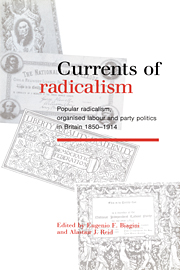 Currents of Radicalism
Currents of Radicalism 1 - Currents of radicalism, 1850–1914
Published online by Cambridge University Press: 07 September 2010
Summary
‘Those who were originally called radicals and afterwards reformers, are called Chartists’ declared Thomas Duncombe before parliament in 1842, a description which if adapted for a later period would provide an apt quotation to set the theme for this collection of essays: ‘those who were originally called Chartists, were afterwards called Liberal and Labour activists’. For our central thesis is that there was a substantial continuity in popular radicalism throughout the nineteenth and into the twentieth century, and as a result the essays stress both the popular elements in Gladstonian Liberalism and the radical liberal elements in the early Labour party.
The continuity between Chartism and Liberalism has not gone unrecognised in the previous literature on the subject of radicalism itself, but the insight has had only a limited impact on more general approaches to the study of the popular politics of the period. Perhaps this can be explained, at least in part, by the fact that many of the major contributions to the history of mid-nineteenth-century British radicalism have come from American scholars. For while their own national background has made them more appreciative of the intellectual content of liberalism and of the importance of democratic traditions, it has also tended to exclude them from full participation in the debates taking place between British historians.
- Type
- Chapter
- Information
- Currents of RadicalismPopular Radicalism, Organised Labour and Party Politics in Britain, 1850–1914, pp. 1 - 20Publisher: Cambridge University PressPrint publication year: 1991
- 6
- Cited by


